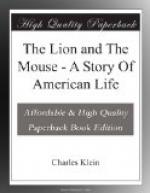When, therefore, she first conceived the idea of portraying in the guise of fiction the personality of John Burkett Ryder, the Colossus of finance whose vast and ever-increasing fortune was fast becoming a public nuisance, she naturally turned to Jefferson for assistance. She wanted to write a book that would be talked about, and which at the same time would open the eyes of the public to this growing peril in their midst—this monster of insensate and unscrupulous greed who, by sheer weight of his ill-gotten gold, was corrupting legislators and judges and trying to enslave the nation. The book, she argued, would perform a public service in awakening all to the common danger. Jefferson fully entered into her views and had furnished her with the information regarding his father that she deemed of value. The book had proven a success beyond their most sanguine expectations, and Shirley had come to Europe for a rest after the many weary months of work that it took to write it.
The acquaintance of his son with the daughter of Judge Rossmore had not escaped the eagle eye of Ryder, Sr., and much to the financier’s annoyance, and even consternation, he had ascertained that Jefferson was a frequent caller at the Rossmore home. He immediately jumped to the conclusion that this could mean only one thing, and fearing what he termed “the consequences of the insanity of immature minds,” he had summoned Jefferson peremptorily to his presence. He told his son that all idea of marriage in that quarter was out of the question for two reasons: One was that Judge Rossmore was his most bitter enemy, the other was that he had hoped to see his son, his destined successor, marry a woman of whom he, Ryder, Sr., could approve. He knew of such a woman, one who would make a far more desirable mate than Miss Rossmore. He alluded, of course, to Kate Roberts, the pretty daughter of his old friend, the Senator. The family interests would benefit by this alliance, which was desirable from every point of view. Jefferson had listened respectfully until his father had finished and then grimly remarked that only one point of view had been overlooked—his own. He did not care for Miss Roberts; he did not think she really cared for him. The marriage was out of the question. Whereupon Ryder, Sr., had fumed and raged, declaring that Jefferson was opposing his will as he always did, and ending with the threat that if his son married Shirley Rossmore without his consent he would disinherit him.
Jefferson was cogitating on these incidents of the last few months when suddenly a feminine voice which he quickly recognised called out in English:
“Hello! Mr. Ryder.”
He looked up and saw two ladies, one young, the other middle aged, smiling at him from an open fiacre which had drawn up to the curb. Jefferson jumped from his seat, upsetting his chair and startling two nervous Frenchmen in his hurry, and hastened out, hat in hand.




